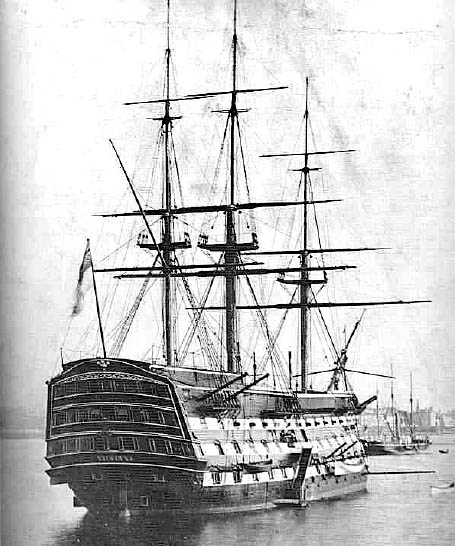Stockwin's Maritime Miscellany
Read Stockwin's Maritime Miscellany Online
Authors: Julian Stockwin



Chapter
1. N
AUTICAL
F
ACTS
& F
EATS
Chapter
2. S
EA
E
XPLORERS
, D
ISCOVERERS
& I
NVENTORS
Chapter
3. T
HE
S
AILORS
’ W
OODEN
W
ORLD
Chapter
4. B
RINY
B
ELIEFS
& S
UPERSTITIONS
Stockwin’s
T
OP
25 M
USEUMS
& H
ISTORIC
S
HIPS
G
OLDEN
A
GE OF
S
AIL
– S
OME
K
EY
D
ATES
 About the Book
About the BookA ditty bag: a small bag used by seamen in the days of old to store small items and persnal treasures.
Full of fascinating facts and sea lore, this book is Julian Stockwin’s own ditty bag of wonders from the Golden Age of Sail. Ranging from the heroic voyages of discovery in the fifteenth century through the iconic Napoleonic wars to the glorious era of the greyhounds of the sea, the clipper ships, he celebrates and explores a colourful world we will never see again.
Drawing on Julian’s own experience in the Navy, both on the lower deck and as an officer, it spans a variety of topics – Nautical Facts & Feats; Sea Explorers, Discoverers & Inventors; The Sailors’ Wooden World; Briny Beliefs & Superstitions and Maritime Misfortunes. Scattered throughout are Salty Sayings, phrases inherited from the sea and very much in use today such as ‘high and dry’, ‘the coast is clear’ and ‘first rate’. Also included is Stockwin’s Top 25 list of maritime museums and historic ships around the world for anyone who wishes to explore further.
Charmingly illustrated with nostalgic black and white line drawings, both old salts and nautical novices will delight in this entertaining and eclectic miscellany.
As far back as he can remember Julian Stockwin has always loved the sea. At the age of 14 he was sent to
Indefatigable
, a sea-training school. He joined the Royal Navy at 15 before transferring to the Royal Australian Navy where he served as a Petty Officer in Vietnam. After leaving the Navy, Stockwin practised as an educational psychologist. He lived for some time in Hong Kong, where he was commissioned into the Royal Navy Reserve. He was awarded the MBE and retired with the rank of lieutenant commander. Stockwin now lives in Devon where he writes the internationally-acclaimed Thomas Kydd series. More information can be found on his website
www.julianstockwin.com

‘But this learned I from my dear mother –
The kiss of a seaman’s worth two of another’
– Anon,
Roxburghe Ballads
, seventeenth century
 Foreword
Foreword
I’ve no idea where my love of Neptune’s Realm comes from, but it’s been a part of me from as far back as I can remember. My mother tells of a very small boy once bringing home a dead sea-bird because it stank so richly of the sea. While none of my immediate family had any salty connections there
was
a distant relative, Tom Clay, who had sailed around the Horn in the lovely clipper
Cutty Sark
, and his stirring tales of iron men in wooden ships could only strengthen my determination to become a sailor. At school I was a dismal scholar, all the time daydreaming of sailing over the horizon to some foreign shore. My father hoped to knock this nonsense out of me by sending me to a tough sea-training school at the age of 14, but it didn’t work and I joined the navy as soon as I could. I had adventures around the world and served both on the lower deck and later as an officer. After swallowing the anchor it’s such a joy to have come full circle and earn my living now by writing about the sea, which I’ve done for the past ten years.
When I was approached by Ebury Press I jumped at the challenge of compiling a selection of maritime wonders from the days of sail. Before steam came along man still had to
woo
the sea, utterly dependent on the wind and the currents – and his nautical skills. The great historical sweep of five centuries that began with the heroic voyages of discovery in the fifteenth century and culminated in the glorious reign of the clipper ship in the 1860s is truly the Golden Age of Sail.
I wish you Fair Winds!
ULIAN
S
TOCKWIN
2009



THE GOLDEN AGE
of Sail is the mother lode for history’s most colourful people and amazing incidents. Where else could you find characters like English seaman turned samurai Richard Adams, who did much to open up Japan to the West in the early seventeenth century; Admiral Richard (‘Black Dick’) Howe of the Royal Navy, who was said never to smile unless a battle was about to begin, and the Russian tsar who loved to disguise himself as a common shipwright and work in an English dockyard? Yet the fairer sex could sometimes demonstrate just as much courage and determination as their men at sea. The last invasion of Britain was not in 1066 at Hastings but in 1797 at a little town in southwest Wales, where troops who had been landed from four French warships surrendered because of the feisty local women.
